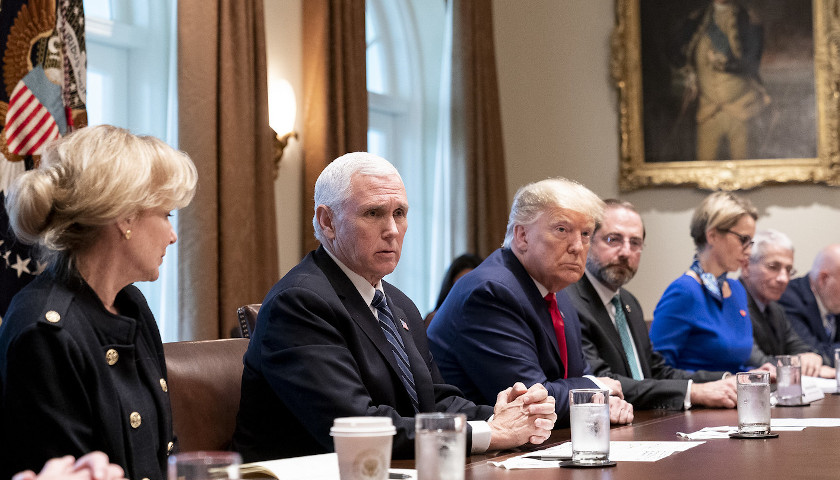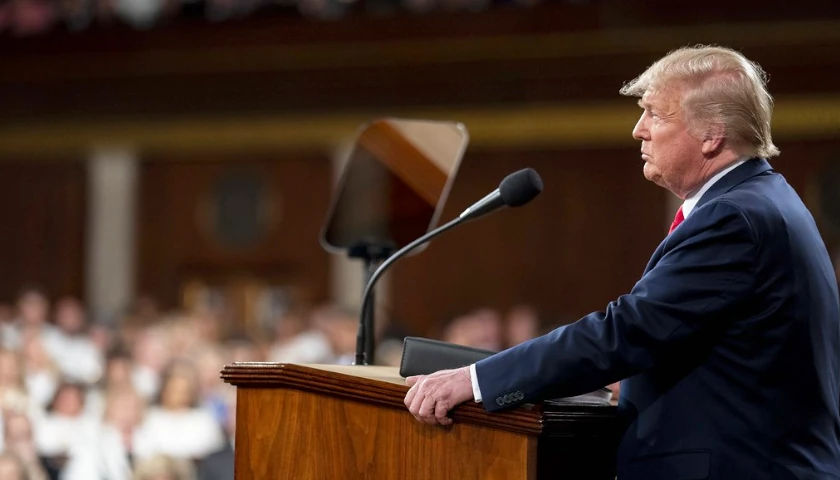by Conrad Black
The attempt to hang coronavirus around the neck of the president is a movement that has gone from a standing start to neck-snapping speed, as opportunities to discredit Donald Trump in the American media generally do.
He was criticized for acting early in restricting access from potentially vulnerable countries, and after for having short-changing the relevant government agencies, even though that didn’t happen. Even the brickbat-wielding Washington Post has had to make the point that, in fact, Trump increased the allocations to public health and disease control authorities.
The more civilized antagonists of the president start by acknowledging that many people who become infected will not even be aware of it, and among those that are diagnosed the mortality rate is around 3 percent. Given the sources for these comforting assurances, I suspect their motives are not so much to placate concern as to lower the threshold at which it may be asserted that the administration is responsible for unnecessary deaths.
Under the Media Microscope
We are already seeing the beginning of a process reminiscent of the media treatment of the Iranian hostage crisis of 1979-1981. “America Held Hostage” was the subtitle of ABC News’ special 11:30 p.m. features news program, and each day was an extension of American humiliation. The incidences of the virus will naturally be announced every day, with the implication that they were avoidable, and the numbers of fatalities will be presented with the implicit message that if the federal government had been more prudent, they would not have occurred.
When precautions taken are fully effective, the authority is usually derided for imagining a crisis and wasting money on it; when the best of precautions cannot stop a problem from happening completely, the authorities were “negligent.” The death watch has already been mounted, and any assurance from the president or his spokespeople that everything is under control and that the country is ready is dismissed out of hand as overconfidence and an effort to use boastfulness to inspire complacency. Thereafter, any incidences of the virus are cited to puncture the supposed complacency of the regime.
The media will scrutinize every word the president utters with the aim of transforming it into a “Brownie, you’re doing a heck of a job” statement. (That was President George W. Bush’s commendation to Federal Emergency Management Agency Director Michael Brown in the immediate aftermath of Hurricane Katrina in 2005, as a quarter of the police force defected, stealing their police cruisers as getaway vehicles, and emergency assistance crews were greeted with sniper fire as they tried to rescue victims.)
Half-Measures from the House
House Speaker Nancy Pelosi (D-Calif.) has already dusted off her “praying for the president” mode from December—when she urged “solemnity and sadness” while she, with infinite affected reluctance, strong-armed her docile House Democratic colleagues into the unfounded and doomed impeachment effort against the president for non-impeachable offenses, the commission of which by the president there was, in any case, no probative evidence.
Unctuous and sepulchral, Pelosi has already begun pretending that the administration has engaged in half-measures and is presumptively responsible for anticipated deaths from the virus. Short of obtaining and releasing cultures of the Coronavirus, the Democrats and their media shills are doing everything they can to lumber the president with this charge, where so many spurious accusations have failed before.
He has moved quickly in assembling a strong team led by Vice President Mike Pence to maintain flows of information and prepare as well as can be done against whatever may come. The Health and Human Services secretary, Alex Azar, has incurred some criticism for having made inadequate use of nearly two months lead time, which may be the reason the president has entrusted this mission to the vice president. But both have spoken fluently and credibly over the few days of this new escalation of the coronavirus as a national threat and issue.
Against the fact that the Democrats, both elected and in the “impartial” media, will represent any further occurrences of the virus as evidence of Trump’s incompetence and indifference, the administration has an opportunity to demonstrate its undoubted efficiency and Trump’s own talents as an executive, as the only serious businessman who has ever held the U.S. presidency.
If all suspected cases are quarantined promptly and there is no evidence of negligence in preventing its penetration of the population, it will be a signal administration victory. Unfortunately, greater human damage in countries that should have acted earlier and didn’t—including China, but possibly also some of America’s allies, likely including South Korea and possibly Japan and Italy—will illustrate the relative and preemptive efficiency of Trump’s handling of the challenge.
A Nerve-Wracking Waiting Game
The danger, apart from that caused by the eagerness of the anti-Trump media—almost punch-drunk from the innumerable defeats they have endured and frenzied at the approach of the president’s probable reelection—is that the constant focus on this disease will discourage the country, dampen the stock market, and place the administration in a vice between seeming overconfident and flippant, or grim and doom-laden. No matter what ravages the virus causes elsewhere, if it never gets to general municipal shutdowns in the United States, the administration will be able to claim a victory.
As incidences are now turning up in small numbers of people who have not been in source countries and so the origin of their initial exposure is unknown, we may not have long to wait to see how widespread this problem is in the United States.
I doubt that serious dislocations in China or elsewhere will be especially damaging to the U.S. economy. There is a fairly extensive pipeline of most vital imports, and considerable latitude to select different or even domestic sources of supply. Any economic damage to the United States will be after much more severe damage to other countries, so the administration should be able to portray America as comparatively fortunate and take some credit for that. The heavy hit to the Dow Jones Industrials last week indicates the market has already overcompensated for anything that has happened or become likely.
This problem is now a nerve-wracking waiting game and neither the optimists nor the alarmists know what to expect.
So far, Trump has done better with a strong show of awareness and readiness than the Democrats have with Senate Minority Leader Chuck Schumer’s (D-N.Y.) asinine allegations of “towering and dangerous incompetence,” and the fatuities about Trump being “anti-science,” and only interested in Wall Street. (Donald Trump has never cared a rap what Wall Street thought about anything, one of his more endearing traits to his followers.)
So far, the depredations of coronavirus in the United States have been slight, and the excesses of the fearmongers have been impetuous and irritating. The Trump Administration has won the first round, but this is a voyage of discovery for everybody and certainly possesses the potential to be a very unpleasant episode.
– – –
Conrad Black has been one of Canada’s most prominent financiers for 40 years, and was one of the leading newspaper publishers in the world as owner of the British telegraph newspapers, the Fairfax newspapers in Australia, the Jerusalem Post, Chicago Sun-Times and scores of smaller newspapers in the U.S., and most of the daily newspapers in Canada. He is the author of authoritative biographies of Franklin D. Roosevelt and Richard Nixon, one-volume histories of the United States and Canada, and most recently of Donald J. Trump: A President Like No Other. He is a member of the British House of Lords as Lord Black of Crossharbour.





